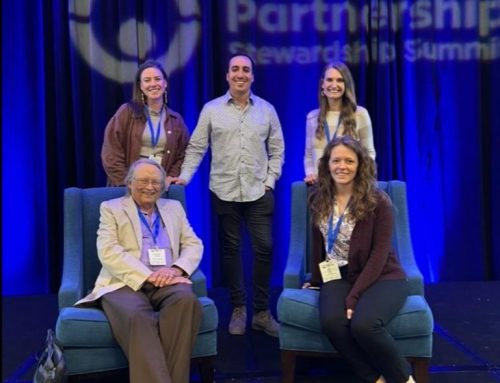Destination Stewardship Report – Summer 2021 (Volume 2, Issue 1)
This post is from the Destination Stewardship Report (Summer 2021, Volume 2, Issue 1), an e-quarterly publication that provides practical information and insights useful to anyone whose work or interests involve improving destination stewardship in a post-pandemic world.
“Reset Tourism” Webinar Series 2 & 3 – The Future of Tourism Coalition‘s four-part “Reset Tourism” series is intended to help destinations emerge from the Covid crisis with new forms of governance and collaboration that will enable a more holistic and sustainable approach to tourism management and development. Our Spring 2021 issue covered the first webinar, on destination stewardship. Below, Jane Slaughter reports on the next two, which address better measures of success (#2) and sustainable supply chains (#3). The fourth, about tools for implementation, is planned for later this year.
Webinar #2: Measuring Tourism’s Impacts and Success
Held on April 22, 2021 the second Future of Tourism Coalition webinar focused on methods for measuring tourism success beyond visitor numbers – to define success instead based on the true value of tourism’s costs and benefits. This webinar went on to examine these new standards for success as well as how they will contribute to a destination’s health and a community’s well being. Below, highlights from the second webinar, with keynote speakers Jeremy Sampson, CEO of the Travel Foundation, and Albert Salman, founder of Green Destinations.
Key Takeaways from the webinar:
- Successful tourism must be redefined through equivalent weighing of costs and benefits.
- Measurements of tourism success must shift to include the effectiveness of the tourism industry in addressing larger issues.
- If any change is to occur, companies must begin to adopt a leadership role in these issues in order to be a part of their solution.
Resources:
View PowerPoint slides by
Watch webinar recording (2 hours)
Keynote – Measurement that Matters
Jeremy Sampson, CEO the Travel Foundation
- Destinations must continue efforts to prevent the problems they faced prior to the pandemic, such as seasonality, economic leakage, low margins, overcrowding, overconsumption, overdependence, fragile environments, exclusion and inequality, future crises, and the climate emergency.
- The externalities and cost of growth for tourism create an ‘invisible burden’ which must be accounted for through the method of holistic accounting across all ecological impacts and costs.
- The tourism industry must include long-term environmental effects and externalities in their costs. Currently, cost measures are ineffective because they neglect to take into account the impact of visitors on communities, natural and built assets, and the greater impacts and risks on the environment.
- This includes new measurements for ecological and sociological impacts based on different standards and certifications such as measuring resident sentiment.
- Destinations must decide what matters most to them and from there implement new tools to measure impact and goal progress.
Keynote – Measuring Sustainability: Why, What, How
Albert Salman, Founder of Green Destinations
- The national government should also be in charge of measuring and solving critical issues. National indicators and indexes are better suited to compare countries, and the same destination indexes can then be measured against their countries to recognize their own unique practices.
- Tourism needs new universal KPI’s to facilitate greater transparency and focus on pressing issues such as ecological impact.
Panel – Sample comments
Idrissia EY Thestrup, Visit Greenland
- These new models must address the needs of community inhabitants impacted by tourism. By polling residents, destinations can promote strategies to benefit the local community including inhabitants unrelated to the tourism industry.
Stephanie Jones, Representing National Blacks in Travel & Tourism Collaborative
- Quality tourism should benefit the local community by maximizing the principles of diversity, equity, and inclusion. Expand diversity in the hiring process, for instance, and maintain multicultural marketing strategies.
Other panelists included: Julián Guerrero-Orozco, Vice Minister of Tourism in Colombia, and Bart Neuts, Research Expert for Visit Flanders.
~~~
Webinar #3: Local and Sustainable Supply Chains
Held on May 6, 2021, the Future of Tourism Coalition discussed the importance of local entrepreneurship and product innovation in order to boost employment and grow the number of local businesses in the tourism supply chain. Webinar participants argued that these local supply chains are required in order to contribute to a low-carbon, circular economy while also creating authentic and positive experiences. Below, highlights from the third webinar, with keynote speakers Paula Vlamings, CIO of Tourism Cares, and Paloma Zapata, CEO of Sustainable Travel International.
Key Takeaways from the webinar:
- In order to achieve true sustainability in tourism, tourist companies must employ local supply chains.
- Maintaining local supply chains are one avenue for mitigating the climate crisis because of tourism’s heavy carbon footprint.
- Some destinations have enacted new action plans for sustainable tourism, such as certifications and incentives.
Resources:
- View all PowerPoint slides
- Watch webinar recording (2 hours)
Keynote – Local Tourism Supply Chains: At the Intersection of Purpose and Product
Paula Vlamings, Tourism Cares
- Sectors of the tourism industries need to create strong and efficient local supply chains.
- This goal can be achieved by examining every part of the supply chain to integrate local businesses and reduce carbon emissions. Tourism businesses should look at their product to see where it is easiest to expand through local sourcing or partnering with local organizations.
- Today, travelers want more constructive travel experiences in ways that sustain the communities and environments of their destinations. They want to support businesses that reflect these ideals.
- Sustainability requires connections and communication across multiple industries, sectors, suppliers, communities, and destinations.
A current challenge is getting NGOs and other social activist groups involved in the tourism market, particularly through consultation and facilitating partnerships with other local businesses.
Keynote – The Path to Localizing and Decarbonizing Tourism Supply Chains
Paloma Zapata, Sustainable Travel International
- Tourism plays a role in the climate crisis, generating emissions via every activity in the value chain. To tackle the climate crisis we need a three prong approach: reducing carbon emissions, restoring the earth’s natural carbon storage levels, and innovating technology to reduce carbon emissions.
- In order to become carbon neutral, destinations can begin by mitigating carbon emissions and encouraging energy-efficient practices. For instance, businesses must quantify the total emissions generated through their supply chain, and set attainable goals for reduction. Businesses should also rely on local supply chains to make destinations more carbon neutral and resilient.
Panel – Sample comments
John De Fries, Hawai‘i Tourism Authority
- One way of achieving sustainability is by thinking of the earth as an island, where natural resources are finite and therefore must be conserved through a regenerative tourism model. Hawai‘i Tourism Authority does this by enacting community-based Destination Management Action Plans (DMAPs) for each island, which aim to rebuild, redefine, and reset the direction of tourism over a three-year period.
Beth Markham, Environmental Sustainability Coordinator, the Town of Vail, Colorado, USA
- To combat the sustainability problems faced by mountain resort communities, such as carbon emissions and wildlife damage, Vail has enacted an Actively Green sustainable business certification program that starts destinations on the path to sustainability through a bottom-up approach. This certification project begins with employee and business accountability through reliance on local supply chains to reduce carbon emissions.
Malia Everette, Altruvistas
- Social justice issues can be recognized in the tourism industry through the creation of customized travel opportunities that stress philanthropy and engagement in local experiences in order to grow spending in the local economy.
Other panelists included: Kirsten Bain, VP of Operations for Contiki Holidays (a subsidiary of the Travel Corporation) and Rodrigo Atuesta, CEO & Co-Founder of IMPULSE travel.
~~~
To continue to dive in to these topics, make sure to sign up for the free quarterly Destination Stewardship Report – a joint project of the Destination Stewardship Center and the Global Sustainable Tourism Council.
About DSR Contributors
Volunteer contributors are welcome to the Destination Stewardship Report. Contact us with your proposals and ideas.




